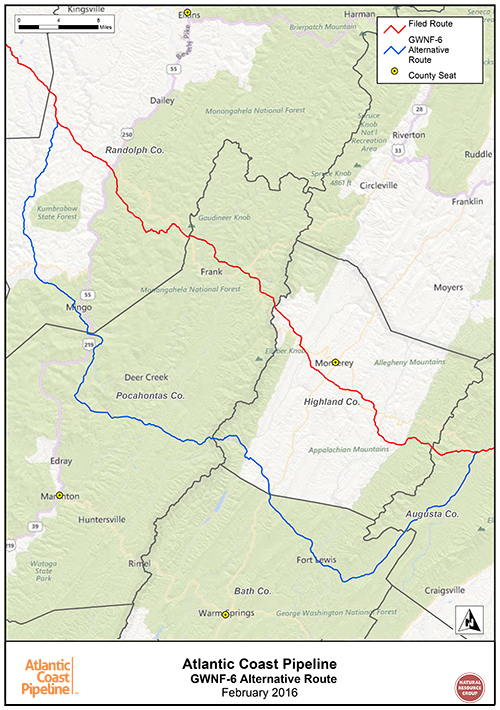New chance to weigh in on controversial Atlantic Coast Pipeline
The public has another chance to weigh in on Dominion’s proposed—and heavily opposed—Atlantic Coast Pipeline, a massive natural gas route that would span nearly 600 miles from West Virginia to North Carolina.
Local communities have intensely opposed the pipeline, which would impact some of the most beautiful remaining wild lands in the region and jeopardize thriving tourism and agriculture along the route.
 The Forest Service rejected Dominion’s original route due to impacts on the George Washington and Monongahela National Forests, so the Federal Energy Regulatory Commission (FERC) has opened a public comment period for the new proposed route, which for the first time includes Virginia’s bucolic Bath County and would impact an additional 249 landowners.
The Forest Service rejected Dominion’s original route due to impacts on the George Washington and Monongahela National Forests, so the Federal Energy Regulatory Commission (FERC) has opened a public comment period for the new proposed route, which for the first time includes Virginia’s bucolic Bath County and would impact an additional 249 landowners.
In addition to submitting written comments to FERC by June 2, concerned community members can attend two all-day meetings later this month to deliver comments in person. FERC will host a meeting in Marlinton, WV on May 20 and in Hot Springs, VA on May 21. Information on submitting comments or attending the meetings is available here.
“This is a critical opportunity for the many opponents of this misguided proposal to make their voices heard,” said SELC Senior Attorney Greg Buppert.
In addition to the significant impacts the proposed pipeline would have on scenic western Virginia, many have questioned the need for such a project, as four natural gas pipelines are currently proposed through Virginia without any regional examination of supply, demand, and pipeline siting to avoid redundancies and over-building.
“We would like to see Dominion take a step back and reconsider the need for this pipeline, rather than continuing to blindly push forward a destructive proposal in the face of tremendous community opposition,” said Buppert. “To prevent unnecessary impacts to our communities and environment, we must understand whether the Atlantic Coast Pipeline and the other three proposed pipelines through western Virginia are truly needed to meet the regional demand for natural gas.”
More information on the FERC meetings and submitting public comments
